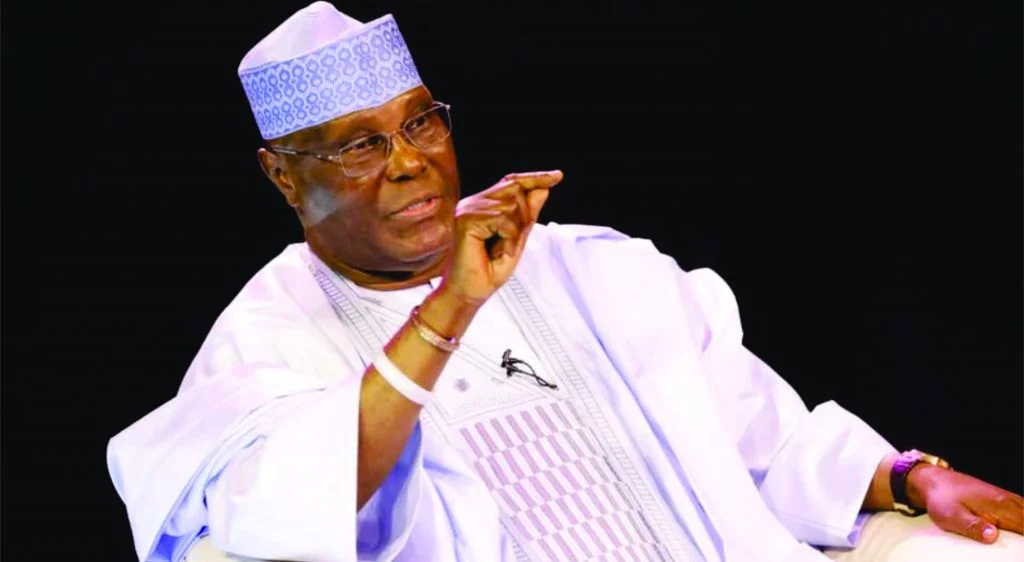News
‘World Bank Report Reveals Why Nigeria Needs Atiku’

‘Against the backdrop of a bleak economic future for Nigeria painted by the World Bank recently, the Peoples Democratic Party Presidential Campaign Council has said the report justifies the need to have its candidate, Atiku Abubakar, elected president of the country to address the nation’s many challenges.
The PUNCH had quoted Alex Sienaert, World Bank’s lead economist for Nigeria, as saying that in 2023, debt servicing will gulp 123.4 per cent of the country’s total revenue.
Sienaert had stated this in a presentation titled ‘Nigeria Public Finance Review: Fiscal Adjustment for Better and Sustainable Development Results’ for the month of November.
READ ALSO: 2023: Atiku, Tinubu Fight Dirty In Bid To Succeed Buhari
“Borrowing more is not the solution: debt costs are rising rapidly, squeezing non-interest spending,” he said, adding that “debt servicing has surged over the past decade and is expected to continue increasing over the medium-term, crowding out productive spending.”
Responding in a statement to the presentation, spokesman of the campaign council, Senator Dino Melaye said, “The solution to the years of the locusts under APC is Atiku Abubakar, who worked under a team that brought great economic prosperity to Nigeria.
“The APC presidential candidate is always eager to dissociate from Buhari, but he carries a DNA that is infused with the APC blood and water. What can he do differently? Besides, if he had a different solution he could have offered it to his failed party so as to pave a smooth way for his own emergence. Having ‘chilled’ with the big boys, he now wants to ‘chill’ alone.
“Nigerians should look forward to the termination of APC’s arrested development when Atiku/Okowa and the PDP return Nigeria to its winning ways. As President Obasanjo said in his famous aphorism, there is no need to reinforce failure.
“What the World Bank report has done is an economic advisory, which Nigerians have to take seriously by looking away from APC and embracing the People’s Democratic Party on February 25, 2023.”
According to the statement, “the recent report by the World Bank, confirming the arrested development experienced under the All Progressives Congress administration since 2015 has more than any other indices, justified the imperative of stopping APC from doing further damage to Nigeria’s economy and social advancement in 2023.
“The APC inherited a healthy economy in 2015, just a year after Nigeria’s economy was re-based, and rated as the largest economy in Africa, ahead of South Africa. Rather than consolidate on the gains recorded by the PDP administration, Buhari and the APC embarked on unprecedented economic amateurism that has thrown Nigeria into one of the least performing economies in Africa. The APC has also thrown Nigeria into such a huge debt doldrum that it would take the country years of creative management to regain lost grounds.
“The APC which premised its campaign on change has succeeded in taking Nigeria back more than 10 years. While they accused their predecessors of corruption, they have now made corruption a state policy and the stench in the high corruption quotient of APC provokes deep revulsion.”
The statement further read, “Nigerians will not forget the great prosperity under the PDP administrations. They can also not forget how the reversal of fortune under APC has brought Nigeria down from prosperity to poverty, resulting in the relegation of Nigerians to a nation of 133 million poor citizens.
“If only Nigerians understood what the APC meant by change! The prodigal son scores better when peered with the APC.
READ ALSO: Tinubu’s Spokesman, Onanuga Narrates How Atiku’s Convoy Almost Kill Him
“Sadly, the poor performance of the APC is not limited to the economy. Insecurity has degenerated by a higher degree. Unemployment is at its worst. The energy crisis remains intractable and unaddressed.
“The Buhari administration and APC are now relying on the Department of State Services to make fuel available to Nigerians. The subsidy programme that came under heavy criticism by APC has not only been sustained but has become an indefensible and convoluted policy in which the supposed poor now pay higher for fuel than the obviously rich. While fuel sells for about N180 in the cities, the rural folks buy the same product at about N300-500 per litre.”
News
Edo SWAN Distances Self From Online Publication Against Enabulele

…demands retraction, warns member against unverified publication
The Sports Writers Association of Nigeria (SWAN), Edo State Chapter, has distanced itself from an online publication titled: ‘Samuel Ogbemudia Stadium Shut Against Stephen Keshi.’
A statement signed by the Secretary of the association, Comrade Idahosa Moses, Edo SWAN said neither was it consulted nor involved in the “framing of the narrative presented by the online publication.”
Edo SWAN described the publication as misleading, sensational and grossly lacking in factual balance.
The statement partly reads: “SWAN finds the report inconsistent with the ethical standards and core values of the journalism profession.
READ ALSO:SWAN Orders Nationwide Boycott Of NFF Activities
“While Edo SWAN recognises and respects the sentiments expressed by Mr. Austin Popo, Secretary of the Board of Trustees of the Stephen Keshi Football and Vocational Training Centre (SKFTVC), concerning the challenges encountered in securing the use of the Samuel Ogbemudia Stadium for this year’s Stephen Keshi Memorial National Under-17 Soccer Tournament, it is imperative to state that such concerns should not be reported in a manner that imputes motives, assigns blame without verification, or portrays public officials as acting in bad faith.”
On allegations against the Executive Chairman of the Edo State Sports Commission, Hon. Amadin Desmond Enabulele, in the publication, SWAN described Enabulele as a “seasoned professional with a proven track record of integrity and dedicated service to sports development in Edo State.”
“Any insinuation that he or the Commission deliberately acted to undermine the memory and legacy of the late Stephen Okechukwu Keshi is not only unfair but also unsupported by verifiable facts.”
Edo SWAN, therefore, “strongly cautions the publisher of Popular News to desist from publishing unverified and inflammatory reports capable of misleading the public and damaging reputations.”
READ ALSO:Botswana’s New President Sworn In As Voters Kick Out Ruling Party Of Nearly Six Decades
“The Association formally demands that the controversial publication be withdrawn immediately and that an unreserved apology be tendered to Hon. Amadin Desmond Enabulele.”
SWAN further “extends its sincere apologies to the Chairman of the Edo State Sports Commission, who is also a Patron of the Edo SWAN Chapter, for any embarrassment or misrepresentation arising from the said publication, and assures him of its continued respect, support and cooperation.”
Edo SWAN, while stating that it “shares in the collective responsibility of preserving and honouring the legacy of the late Stephen Keshi—a national icon whose contributions to Nigerian football remain indelible—the Association, maintained that “this noble course must be pursued through constructive engagement, professionalism and mutual respect among all stakeholders.”
Edo SWAN, thereafter, warned “all sports writers in the state to avoid unverifiable reports and sensationalism, stressing that any member found culpable of professional misconduct will be decisively sanctioned in line with the Association’s statutes.”
News
Court Dissolves Petitioner’s Marriage Over Lack Of Love, Care

An Area Court sitting at Centre-Igboro, Ilorin in Kwara State, on Thursday, dissolved the four-year-old marriage between Aminat Mustapha and Wahab Adeshina, following the petitioner’s insistence.
The petitioner told the court that she was no longer interested in her marriage to her husband following claims of lack of love and care.
According to the News Agency of Nigeria (NAN), while delivering ruling, the presiding judge, Mr Toyin Aluko, held that the respondent had written to the court, accepting the divorce application made by his wife.
READ ALSO:Why I Charged My Husband Money For Sex —Woman
Aluko, consequently, dissolved the marriage between the parties, and ordered the woman to observe one month iddah (waiting period) before she could remarry.
Meanwhile, the court granted custody of the two children in the marriage, ages one and three, to their mother.
He ordered the father to pay a monthly sum of N20,000 for the children’s feeding and maintenance.
The court also held that the respondent will be responsible for their education and healthcare.
Again, the court held that the father has unrestricted access to his children, but at reasonable time adding that he should be notified before any decision is taken on his children.
The judge ordered the petitioner to get a copy of the judgment and send same to the respondent.
News
Tinubu Embarks On Three-state Visit

President Bola Ahmed Tinubu will depart Abuja on Saturday on a working visit to Borno, Bauchi and Lagos.
This is contained in a statement issued by Presidential Spokesperson, Mr Bayo Onanuga, on Friday in Abuja.
While in Borno, the President will commission projects executed by the Borno State Government under Gov. Babagana Zulum, in collaboration with the Federal Government.
He will also attend the wedding ceremony of Sadeeq Sheriff, son of former Borno Governor, Sen. Ali Modu Sheriff, and his bride, Hadiza Kam Salem.
READ ALSO:Ambassadorial Nominees: Ndume Asks Tinubu To Withdraw List
From Maiduguri, Tinubu will proceed to Bauchi State to condole with the state government and the family of Sheikh Dahiru Bauchi, the renowned Islamic cleric and leader of the Tijjaniyya Muslim Brotherhood.
Sheikh Dahiru Bauchi died on Nov. 27.
After the condolence visit, the President will travel to Lagos, where he will spend the end-of-year holidays.
During his stay in Lagos, Tinubu is expected to attend several engagements, including the Eyo Festival scheduled for Dec. 27.
The festival, to be held at Tafawa Balewa Square, will honour notable personalities, including the President’s late mother, Alhaja Abibatu Mogaji, former Lagos State governors Alhaji Lateef Jakande and Chief Michael Otedola.

 Metro5 days ago
Metro5 days agoAlleged Organ Harvesting: Bereaved Families Rush To Check Corpses

 News5 days ago
News5 days agoForest Reserve: Okpebholo Broker Peace Between Host Communities, Investors

 News4 days ago
News4 days agoPolice Confirm Edo Tanker Explosion, say No Casualty

 News3 days ago
News3 days agoFormer Delta North senator Peter Nwaoboshi Dies

 News4 days ago
News4 days agoEdo SSG Calls On Media To Support Govt Policies, Assures Better Welfare

 Metro2 days ago
Metro2 days agoJUST IN: Former Edo Information Commissioner Is Dead

 News4 days ago
News4 days agoGrassroots To Global Podium: Edo Sports Commission Marks Enabulele’s First Year In Office

 News4 days ago
News4 days agoOtuaro Tasks Media On Objective Reportage

 News4 days ago
News4 days agoIPF Hosts Media Conference, Seeks Protection For N’Delta Environment

 News4 days ago
News4 days agoOkpebholo Sympathises With Otaru, People of Auchi Over Tragic Tanker Fire Incident






























